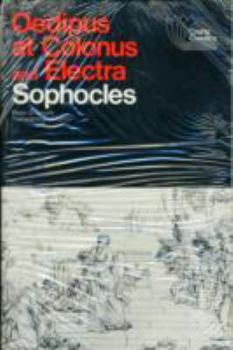Oedipus at Colonus and Electra
Two plays that illustrate a constant of Greek drama -- the reexamination of familiar themes to detect contemporary meanings. Translated and edited by Peter D Arnott, this edition contains both Oedipus... This description may be from another edition of this product.
Format:Paperback
Language:English
ISBN:0882951076
ISBN13:9780882951072
Release Date:January 1975
Publisher:Harlan Davidson
Length:110 Pages
Weight:0.30 lbs.
Dimensions:0.4" x 5.7" x 7.4"
Related Subjects
DramaCustomer Reviews
3 ratings
Sophocles' final play and the idea suffering is redemptive
Published by Thriftbooks.com User , 22 years ago
In Homer's "Iliad" the one reference to Oedipus suggests he ruled in Thebes until he was killed in battle. However, in the more famous version of the tale, told by Sophocles in his classic Greek tragedy "Oedipus the King," Oedipus blinds himself and leaves Thebes. In "Oedipus at Colonus" Sophocles tells of the final fate of the exiled figure. Colonus is a village outside Athens, where the blind, old man has become a benevolent source of defense to the land that has given him his final refuge. "Oedipus at Colonus was produced posthumously in 401 B.C.E., and the legend is that it was used by Sophocles as his defense against the charge of senility brought by his children. In terms of its lack of dramatic structure (the scenes are connected by the character of Oedipus rather than by the loosely constructed plot) and the melancholy of its lyric odes it is the most atypical of the extant plays of Sophocles. "Oedipus at Colonus" is the most poetic of his plays while being the least dramatic as well. But it is the characterization of Oedipus as a noble figure that stands out. This is still the same proud and hot-tempered figure who vowed to solve the reason for the curse on Thebes in the earlier play. But this is also an Oedipus who has accepted his punishment, even though he insists that he is innocent. After all, the sin responsible for his exile was really that of his mother; if you read "Oedipus the King" carefully you will see that the incestuous part of the prophecy was added by the Oracle after Jocasta tried to have her infant son killed in order to save her husband's life. Consequently, when Oedipus claims to be a helpless victim of destiny, there is ample reason to agree with his interpretation of events.The fact that this was the last play written by Sophocles offers a line of analysis for understanding "Oedipus at Colonus" as well. You can read in certain lyrics, such as the first "staismon" with its ode to Colonus and the characterization of King Theseus of Athens, the playwright's praise for the democratic institutions and proud history of Athens. On a more psychological level you can consider the play as articulating Sophocles' views on death. These other considerations tend to reduce the importance of the title character, but there is the compelling argument of the play that through his personal suffering Oedipus has been purified.
A Worthy Sequel to "Oedipus Rex"
Published by Thriftbooks.com User , 24 years ago
Many people make the mistake of only reading part 1 of this trilogy. In my opinion, it is a horrible mistake to ignore parts 2 and 3. The blind Oedipus is touchingly lead by his daughter. (I can not help but suspect this inspired the relationship between Edgar and Gloucester in Shakespeare's "King Lear.") It is also in this play that we see Creon is not exactly an outstanding citizen. He seemed nice enough in part 1, but once he has Oedipus' power, he is somewhat of a tyrant. It is also in part 2 that we are able to get a closer look at Oedipus. (REMEMBER, HE DID NOT KNOW HE HAD KILLED HIS FATHER, MARRIED HIS MOTHER, AND HAD CHILDREN WITH HIS MOTHER.) It is in this play that we see the human side of Oedipus. I can not overestimate the beauty of the scene where "seemingly sighted" he enters the Greek Version of heaven. Again remember, the story does not end here. You MUST read "Antigone" (Part 3).
Will the blind and banished Oedipus find a haven?
Published by Thriftbooks.com User , 25 years ago
The well-constructed "Oedipus at Colonus" (405 B. C.) was first produced after the death of Sophocles. It shared first prize in Athens along with some other plays. It is apparently a reflection of a quarrel between Sophocles and his own sons. An aged Oedipus, nearing death, seeks a haven and curses his sons, prophesing their own deaths.






